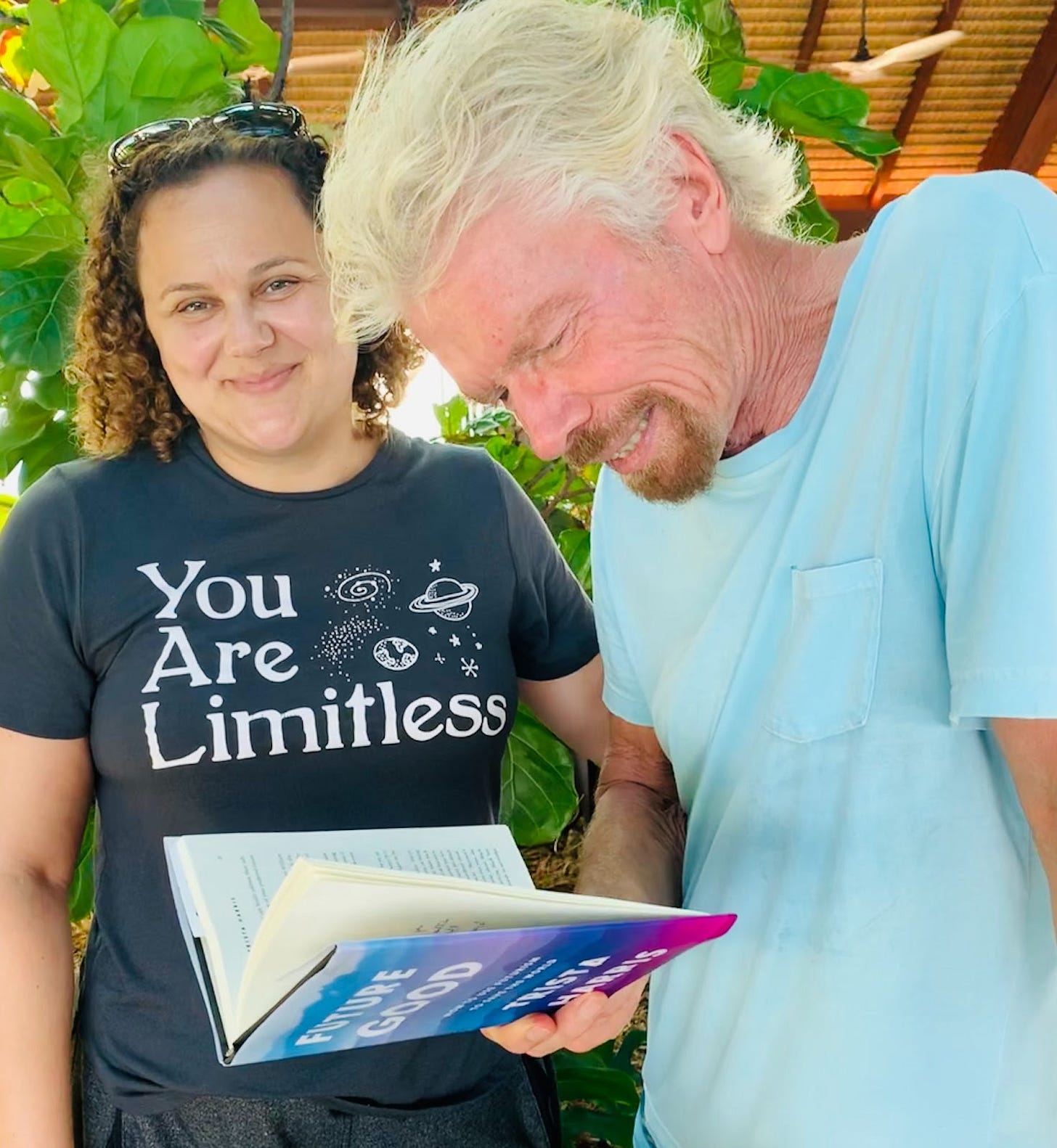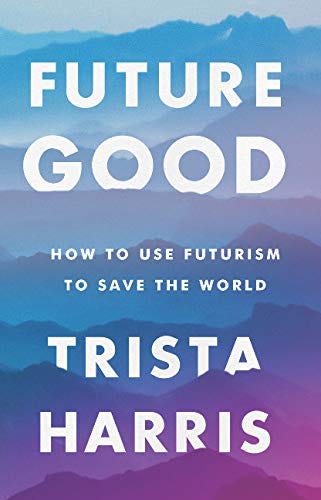Remember, you can watch the Superpowers for Good show on e360tv. To watch the episode, download the #e360tv channel app to your streaming device–Roku, AppleTV or AmazonFireTV–or your mobile device. You can even watch it on the web.
When you purchase an item after clicking a link here, we may earn a commission. It’s an easy way to support our work.
Devin: What is your superpower?
Trista: My superpower is helping other people predict and shape the future.
Trista Harris is the author of FutureGood and founder and president of a consulting firm by the same name that helps “visionary leaders build a more beautiful and equitable future” using strategic planning and visioning tools.
The future is scary to anyone who has seen one of the Terminator movies or who has read about a self-driving car killing someone. There is some valid foundation for that fear, Trista notes.
She shared a recent experience of a large robot hugging her; factory managers can train it to replace humans performing various repetitive tasks. The owners who replace humans with more cost-efficient (profitable) robots will naturally benefit. How do workers benefit?
Trista suggests taxing robots and distributing the funds as a universal basic income (UBI), celebrating the fact that humans could be relieved of work that we don’t enjoy. She sees a future where we work fewer hours and still earn as much.
“We're doing a lot of work at FutureGood to think about what a more beautiful and equitable future looks like where we can use these tools but not get the sort of dystopian science fiction version of the future that I think many of your viewers are probably a little worried about,” Trista says.
There are good uses for AI as well. It can also enhance the work of nonprofits, helping them become more efficient at delivering impact and raising more money.

Over the years, Trista has polished her superpower, helping others predict and shape the future. It enables her to help organizations do more good.
AI Episode Summary
In this episode, Devin Thorpe interviews Trista Harris, the President of FutureGood, about the future of good and philanthropy.
Trista shares her experience of attending a futurist conference where she saw a robot designed to replace humans on a production line.
She believes that robotics and artificial intelligence can free humans from repetitive work and allow them to focus on more meaningful tasks.
Trista mentions the challenges of ensuring a more equitable future and emphasizes the need to tax these tools appropriately and redistribute the wealth generated.
Devin discusses the impact of technology on his own life and how it is changing at an unprecedented rate.
Trista highlights the potential of artificial intelligence in the social sector, particularly in fundraising and customization of donor communications.
She cautions against organizations using these tools to replace human workers entirely and advocates for a reduction in work hours with fair compensation through universal basic income.
Trista shares her experience of interviewing Richard Branson, who she admires for his philanthropic work, and how it inspired her to write her book, "FutureGood."
Trista Harris talks about her consultancy, FutureGood, which helps visionary leaders build a more equitable future through strategic planning, visioning work, and teaching futurism skills.
Trista’s superpower is helping people predict and shape the future. She shares a success story of a politician who was able to transform her community through her leadership, facilitated by FutureGood retreats and training programs.
How to Develop Helping Others Predict and Shape the Future As a Superpower
Trista hosts mastermind retreats for her clients in the social sector who want to increase their impact. At her first event, one of the participants expressed interest in running for office. Another had recently run; she shared the challenges and difficulties in an hours-long conversation.
In the wee hours of the morning, as the group adjourned, she admitted, however, that many opportunities had come from her campaign. She recommended running.
“Soon after the retreat, this woman decided to run. We fundraised for her, and we had a group chat of encouragement. One of the mastermind members became our finance chair for her campaign,” Trista says. “She was elected, the youngest and the only Filipino American woman that had ever been on the county board for Hennepin County, the largest county in Minnesota.”
Trista has some tips for developing the ability to predict and shape the future:
Set aside 5 percent of your time for working on the future
Set and follow Google alerts using the keyword “future” along with your domain’s keywords
Connect with others over Slack or similar communities to discuss the ideas
By following Trista’s advice, you can develop skills that will help you predict and shape the future–and help others do the same. With practice, you could make it a superpower that enables you to do more good in the world.
Remember, however, that research into success suggests that building on your own superpowers is more important than creating new ones or overcoming weaknesses. You do you!
Guest Profile
Trista Harris (she/her):
Philanthropic Futurist and President, FutureGood
About FutureGood: FutureGood is a consultancy that helps visionary leaders build a better future through strategic visioning, retreats, cohorts, and online learning programs.
Website: www.WeAreFutureGood.com
Twitter Handle: @WeAreFutureGood
Company Facebook Page: https://www.facebook.com/WeAreFutureGood
Biographical Information: Trista Harris is a philanthropic futurist and is nationally known as a passionate advocate for leaders in the philanthropic and nonprofit sectors. Trista’s work has been covered by the Chronicle of Philanthropy, Forbes, CNN, the New York Times, and numerous social sector blogs. She is also the co-author of the book “How to Become a Nonprofit Rockstar” and the author of “FutureGood.” She is the President of FutureGood, a consultancy focused on helping visionaries build a better future.
She has spent her whole career dedicated to the social sector, starting with a job as a summer parks assistant at the age of 15. Before starting FutureGood, Trista was President of the Minnesota Council on Foundations, a vibrant community of grantmakers who award more than $1.5 billion annually. Prior to joining MCF in 2013, she was executive director of the Headwaters Foundation for Justice in Minneapolis, and she previously served as a program officer at the St. Paul Foundation.
Trista has been certified in strategic foresight by Oxford University, earned her Master of Public Policy degree from the Humphrey School of Public Affairs, University of Minnesota, and her Bachelor of Arts from Howard University. She is a board member for Tides, one of the largest social justice funders in the world that provides fiscal sponsorship, donor-advised funds, impact investing, and a variety of grantmaking solutions to advance social justice and equity. Trista served on the Minnesota Super Bowl Host Committee and the Governor’s Council on Law Enforcement and Community Relations, which was convened after the shooting of Philando Castile. She is a passionate national advocate for the social sector, using the tools of futurism to solve our communities’ most pressing challenges.
Twitter Handle: @TristaHarris
Personal Facebook Profile: facebook.com/Tristaharris
Linkedin: linkedin.com/company/futuregoodstudio
Instagram Handle: @weare_futuregood



















Share this post